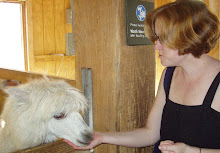It has been a long time since we've seen a historical mini-series on television. It has been even longer since a historical mini-series has had the mainstream push that HBO's miniseries event John Adams has had. The buzz before the show has caused even non-geek excitement about this decidedly unsexy historical figure.
Yes. I said unsexy. John Adams did not exactly cut the most dashing of colonial figures but David McCullough strives to give him, and his extraordinary wife, their due in this mini-series. So far.
I'll admit. I'm leery of bio-pics in general and even more concerned about drama that features such prominent historical figures. So often writers tend to weigh heavily on hyperbole, reverence and/or revulsion when it comes to such subjects. The person(s) in question are usually either overly praised or mercilessly "exposed" for their shortcomings as suits the writer's whim and rarely do I walk away with a sense of the real human. Rather, I tend to walk away with a better understanding of the writer's opinion of the person and the circumstances involved. Drama is not meant to "report", but rather to "retell" and there is a lot of wiggle room in retelling and that can lead to critical distortions of the truth.
Luckily, the first two episodes of this series seem to side-step these land mines. So far the text has yet to exalt or defile the man, but has sought to explore his dilemmas as if they were urgent- not foregone conclusions. We are allowed to empathize with Adams and that empathy is strikingly tempered by the input of his intelligent and insightful wife- Abigail.
Historically speaking, their relationship was an extraordinary partnership of intellectual equals and proves itself more than worthy of exploration by our modern culture awash with all kinds of gender role confusion and conflict. Here is where Giamatti and Linney have earned their salt. Not only have they deftly handled the circumstances of time and place, but they have shattered the expectations and preconceived notions of that time and place. In their hands, John and Abigail are loving and playful with one another in a way that brings the audience beyond the formality of colonial culture and language. Their rapport is deeply personal and the shadows of resentment that flicker through Abigail's eyes as she watches her ambitious beloved leave her to tend to the children and the farm again and again I can only describe as deeply resonant.
I do wonder, however, how much "speechifyin'" from the ornery and loquacious Adams the series can support. At the moment the speeches and the rants are fascinatingly juxtaposed with Adam's insecurity, but can that theme progress from here on out? I do hope that it can, but that is a piece of dramatic gymnastics considering the man's choices as he passes through his life. We will just have to wait and see.
The series is, on the whole, very well cast and well shot by Tak Fujimoto- with the exception of some tiresome hand-held footage during the Boston Massacre, but that can be forgiven. I understand that choice. However, I must make note of an actor who tickles my fancy somewhat these days and that is Tom Wilkinson as the cantankerous Benjamin Franklin. He blows onto the small screen with a wittily dismissive air and overshadows Adams with ease. I am eager to watch this historical relationship and all of its complexity unfold. The small taste I've had has been a delight.
If you haven't seen the first two episodes yet, find a way to catch up. You won't be sorry.
Tuesday, March 18, 2008
Subscribe to:
Post Comments (Atom)



No comments:
Post a Comment